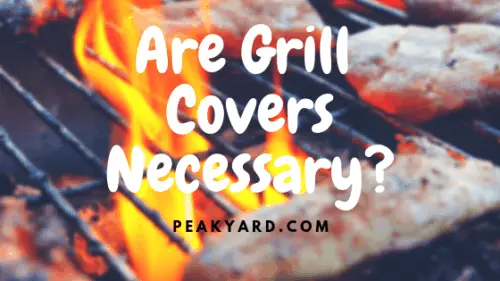Let’s face it, a grill cover can be a huge pain to put on and take off the grill. For many us, it is the last thing we want to deal with after we have feasted on a delicious BBQ meal. Additionally, if your grill is located in an area without a lot of space, there may be the an issue with trying to find a place to store the cover when the grill is in use. With the troubles that grill covers may cause, is it necessary to use one on a grill?
Table of Contents
Cover or No Cover?
There is potential for corrosion or rust even with stainless steel. This might be hard to believe since the use of the word “stainless” seems to indicated rust-proof. However, as General Electric explains, the main ingredient of stainless is, well, steel. Steel will undoubtedly rust. The steel in stainless steel grills is protected by a thin layer of chromium oxide which creates a rust-proof barrier. If this layer is damaged, the steel can be exposed to the elements and rust can form.
Cheap grills often have non-stainless steel or aluminum material that can rust or corrode quickly if not protected from the harsh weather. If you want this type of grill to last, you should cover it after each use or at least when the bad weather rolls in.
High-quality stainless grills can typically withstand quite a bit, but there are some elements found in yards that can destroy the chromium oxide protective layer and produce rust. Consumer Reports states that things such as pool chemicals, sap, and lawn chemicals may cause a stainless steel grill to rust because they can dissolve the chromium oxide layer.
So, are grill covers necessary? We would say yes if you have a cheap grill without stainless steel parts or material. A cover will help deter rust or corrosion and potentially extend the life of the grill.
While stainless steel grills can take a beating from the elements, we would still recommend routinely covering them as a preventive measure. Yes, there are people who have a Weber grill, for example, and claim their grill looks like new after years without covering it. However, you typically spend hundreds or potential thousands of dollars on this type of grill, so why not take the extra step to protect it with a cover. At the very least, we recommend covering your stainless steel grill over the winter or when bad weather is expected.
Other Reasons to Use a Grill Cover
While rust protection is one of the primary reasons to cover a grill, there are others factors for doing so:
- Pest Deterrent – A grill cover can provide decent protection from larger animals gaining access to your grill. This is especially true if the cover has drawstrings at the bottom to pull it tight against the grill. Unfortunately, a grill cover can also provide a safe haven for animals if they can gain access to the grill underneath a loose cover.
- Keeps Water Out – Rain can cause a mess inside a grill if it mixes with charcoal, debris, or overflows the drip pan. A cover will help deter water from leaking into the grill.
- Dings, Dents, & Scratches – A grill cover can potentially prevent damages from objects such as fallen branches, hail, misdirected balls, and so on.
- Tool & Fuel Protection – Grills occasionally contain areas where you can store your grill tools (grill brushes, spatula, tongs, etc.) on the outside of the grill. A grill cover will protect these items from exposure to the elements and potential extend their life. Additionally, if you store your charcoal or other fuels in the grill, a cover will help keep them dry.
- Keeping it Pretty – A grill cover keeps the dust and debris off the grill, which allows you to not have to clean it as often.
What Grill Cover Should You Buy?
You should consider a polyester grill cover that has vents. The vents help reduce the amount of humidity that is trapped between the grill cover and grill. Humidity represents water vapor, which is something you should avoid exposing to your grill.
Additionally, you should look for a heavy-duty grill cover that is waterproof, crack resistant, rip resistant, and wind resistant. By wind resistant we mean that it contains straps or draw strings that can pull the cover close against the grill so that a strong wind does not blow the cover across the yard.
Lastly, the grill cover should appropriately fit your grill. You should measure your grill from its highest point to the ground. Then measure from the grills farthest point left to the farthest point to the right. Furthermore, you should jot down the depth from the furthest points from back to front. Once you have these measurements, you can then look for a quality grill cover that fits your grill.


